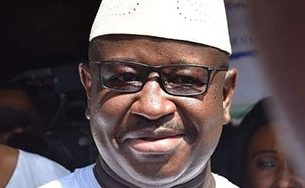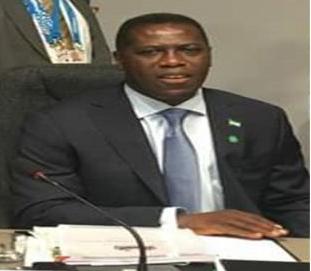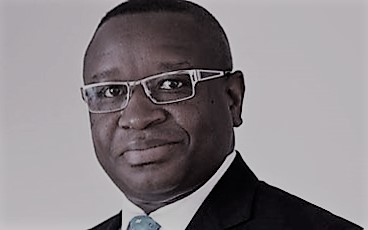Time to end Sierra Leone’s dependency on aid
To begin a case study about the history of debt accumulation in Sierra Leone, I candidly needed to build some convincing arguments against our growing fascination with international borrowing. Why does a small country of 6 million so heavily rely on foreign donors rather than developing its own internal budgetary system to finance government’s expenditures? Is it the lack of a political vision and the lack of strategic leadership that is the reason why we could not maintain a balanced budget? Is it the absence of surplus revenues and robust national savings the major problems of our massive debt situation? I want to dig deeper into the history pages of the debt story about Sierra Leone. (Photo: Mohamed C Bah, NDA Presidential aspirant)
DEBT HISTORY
Let’s go back to 1970 when our debt was $59 million. Our debt astronomically ballooned in 1980 to $433 million by the reckless spending of President Siaka Stevens who wanted to impress his fellow African leaders by hosting an expensive OAU summit. Since then, Sierra Leone lost its way into the dark alley of a pyramid of debt. The source of the problems: a consistent pattern of irresponsible borrowing by succeeding leadership (both the APC and SLPP government), while the International Financial Institutions turned a blind eye to the huge concession loans it was lending to the cash strapped government of Sierra Leone.
From 1990 to 2000, President Momoh, Captain Strasser, and President Kabba more than quadrupled our national debt to $1.2 billion. Again, from 2001 to 2006, we went to another $1.6 billion with no serious government effort to control the spiraling debt crisis either by reducing spending or plugging the hole on institutionalized corruption. Today, Sierra Leone cannot even show what happened to the millions of dollars of aid money that it received for the past 40 years.
We must, however, commend President Kabba’s government for helping Sierra Leone qualify in 2002 as one of the “heavily indebted poor countries” (HIPC) both with the IMF and the “multi lateral debt initiatives” (MDRI) programs. Sierra Leone received a total debt cancellation of $1.6 billion in 2006 with a balance of only $100 million on the creditor’s financial books.
With such an impressive milestone, it was expected that Sierra Leone would move forward to securing an international credit rating, become a debt-free nation and join the prestigious nations of International bond holders like Ghana, Botswana and Mauritius.
Instead, we are running around donor conferences, holding donor workshops and expecting some overnight miracles from multi-national investors to open their doors for business in Sierra Leone. Indeed, empty talks and handshakes will not bring the IBM Company, Microsoft production plants, Toyota, or Honda Car manufacturers and Rice processing factories to Sierra Leone. It is the scope of the risk assessment, the transparency in government, the quality of infrastructure and good investment climate that will ultimately determine the level of investments in any modernized country.
Presently, our new external debt stands at around $800 million today. This means, Sierra Leone has relapsed into its manic addiction of aid money. Instead of paying down the $100 million to a zero balance in 2006, we went back to the drawing board on a spending spree like a kid in the candy store.
If this reckless spending pattern continues, we will exceed the $1.6 trillion that the International creditors (IMF, Paris Club and World Bank) cancelled in 2006 by the end of this year. The negative impulse of borrowing will continue to prevent us from becoming a debt-free nation ready to be fully participant in the global society. And Foreign Direct Investments (FDI) will timelessly evade us as long as we are buried in the dark grey clouds of debt.
AID MONEY
It is therefore time for a change. Aid money is not free. African countries including Sierra Leone pay close to $20 billion in debt repayments per annum to international banks. And it is paid at the expense of the education and health budgets. Over the past 60 years, at least $1 trillion dollars of development aid money has been paid to African governments. Donor money historically is a “short term solution” that Band-Aids the wounds but never prevents the accident. It solves the immediate problems but never addresses the long term sustainable growth.
I think aid has made my country, by and large, poorer, and the prospect of economic growth dismal. This man made “humanitarian disaster” has left Sierra Leone with a huge debt burden and a poorly managed economy. It has increased poverty and corruption, created an inflationary prone market and discourages foreign investments.
But we have a choice to change course and find responsible ways to better manage our debt and economy. Otherwise, we will always see our promising young men and women languishing in the corners of our streets with no jobs or income to support their families.
Furthermore, the size of our international debt and the risk level has made investors less attracted to finding a good market in Sierra Leone. And why do we have a huge percentage of our national budget largely coming from the Department for International Development (DFID) in the United Kingdom (UK), the European Union (EU), China, Japan, and the United States of America? Why do we seem to believe that investors can bring their capital investments when they know we cannot even account for our own money let alone the “aid dollars” they give us?
We must begin to build a leadership of trust with an economy that is market oriented before multi-national companies will be willing to open new industries and new markets in Sierra Leone. The World Bank did not impose their will on us; we made the conscious decision to accept these outrageous concession loans. The fault stops at our doorsteps not at the World Bank Headquarter in Washington D.C.
Frankly, Sierra Leone must take the long road that leads to a donor-free economy with an investment strategy that establishes job creation, access to capital markets and surplus foreign reserves. Our nation must participate in the China “new African initiatives” of large scale investment in infrastructure. We must increase free trade with the European Union (EU), Japan and the United States in agricultural products (not only mineral resources).
It is time to diversify our economy into the financial services, manufacturing, shipping, maritime and fishing industries on a larger scale. We cannot generate $270 million revenue in 2010 and then incur major expenditures worth $372 million in 2010. We must be able to balance our trade deficit by exporting both our mineral resources and natural commodities. We must foster the microfinance institutions that flourished in Asia and Latin America. We must end the vicious cycle of aid money financing. It is not working.
NEW ECONOMIC FORMULA
And what is the new economic formula for the next twenty years? Can we continue to be trapped into the debt-cycle even when the international financial institutions know that aid is the problem rather than the economic solution? We just celebrated our 50th golden jubilee on April 27, 2011, yet Sierra Leone has not gained its economic independence from Britain simply because we still depend on them for supplementary budget assistance.
We need to formulate a new plan of action if we are serious about reducing our debt, by increasing our revenues and eliminating the aid culture. Let’s have only 5 per cent of our development financing to come from aid, 35 per cent from trade (particularly with the EU and China), 26 per cent from foreign direct investment (FDI), 10 per cent from capital market (access to international bond market) and the 25 per cent to come from remittance (Diaspora sending money) with robust domestic savings. Let’s end the signing of these so-called “loan guarantees” (subprime interest loans) or the financing of a water project for Koinadugu District through “concession loans” from the World Bank Institution.
TRANSPARENT INSTITUTIONS
With this new ambitious economic vision, particularly building a transparent system to track, verify and monitor government spending and incomes; we can create a solid economic growth beyond our imagination. If we have stronger and credible public institutions like the civil service and banking sector, we can build foreign reserves and massive national savings through foreign investments, tax revenues and export earnings. We can create jobs for millions of Sierra Leoneans and establish a new credit market system where business investors can get cash flow to operate their investment holdings.
And good governance can also lead to Sierra Leone’s improvement in its credit rating system. We can become active participants in the global market by selling international bonds and using them as collateral to get low interest loans from International financial institutions and investors. At least, the necessary financial loans locally or internationally (the 5% formula) are acceptable as long as they are low interest and affordable to pay within a short period of time.
TRADE NOT AID
Thus, Sierra Leone must change the way it operates and runs its national economy. We cannot borrow money to create jobs or build roads and hospitals endlessly. We must have the nationally funded budget to pay for such projects without reliance on external debt.
Trading with our donor partners is a game changer and a new principle strategy that can get us out of the debt dilemma. If we want to create jobs for our youths, reduce poverty and redefine a viable post jubilee century, let us trade our coffee, cocoa, cassava and other natural commodities with China and the EU. Let’s expand our fisheries and build a new maritime shipping hub for the West African region since we are already close to Europe.
Indeed, trade is the engine of growth. A country like China should be one of Sierra Leone’s strongest trading partners. From 2000 to 2005, China’s foreign direct investment in Africa was $30 billion. Thus, Sierra Leone must seek a larger trading market with China instead of constantly begging for free handouts. If Kenya has tea, Ghana has coffee and Botswana has beef for trade, can Sierra Leone not export its cocoa and other agricultural commodities to China, EU and the United States of America? Absolutely, we can do it. I believe in what Sierra Leone can do if we set our minds to doing it.
Invariably, trade creates employment, improves trade balances, lowers the price of goods and generates income through tariffs and income taxes. We must no longer single handedly focus on the extracting industry (mineral resources) alone; we must diversify our economic portfolio to improve the volume of our revenues, capacitate our unemployed youths with attractive jobs and rebuild the infrastructural network of Sierra Leone.
If we tragically fail to change our economic behavior, these donor institutions will unavoidably suffer from the “donor fatigue” syndrome and where can Sierra Leone get the money to pay for development programs or the operation of government institutions? It is time to end this international welfare system that keeps us begging for more and doing little to change the future of our country. We all want a debt-free nation for our children.
Nonetheless, we must credit the government of Sierra Leone for gradually becoming an investor friendly country. It is noteworthy to mention that Sierra Leone has one of the strongest investor protection laws in Sub Saharan Africa since 2007. The processing time to obtain necessary permits, licenses and inspection has reduced from 26 days in 2008 to 12 days in 2010. Sierra Leone leads Ghana and the rest of West Africa on the overall World Bank rating for a favorable environment to start a new business. That is welcoming news for any nation-loving Sierra Leonean. We have the potential to turn our economy around and I know my country has a brighter future ahead.
But we are seriously a long way from reducing our dependency on aid and the culture of debt that has paralyzed the economic spine of our government. We need some strong leadership to take us out of the depressive state of our donor addictions. We need a debt management strategy with comprehensive national debt laws that will help to bring our spiraling debt under control.
As the Zambian Economist, Dambisa Mayo categorically said: “aid has been and continues to be an unmitigated political, economic and humanitarian disaster for most part of the developing world” and for Sierra Leone, it is time to end that dependency which has fostered too much corruption, and discouraged economic creativity that leads to innovation and prosperity for all.
By NDA Presidential Aspirant, Mohamed C. Bah
Stay with Sierra Express Media, for your trusted place in news!
© 2011, https:. All rights reserved.







momoduba m kamara
/
am intrested 4 the progress of the land that we love.
22nd May 2011John Birchall
/
A brave piece and one that must be addressed. I will use this as part of my seminar at SOAS, London this week. We are thinking of 50 years, its lessons and the future. Many thanks,
17th May 2011John
Christopher Arthur Johnson
/
For public disclosure, I am not a member of NDA or any political parties in Sierra Leone at this time. However, I will like to say that I agree with the analysis and statements of Mr. Bah. As there is no way a country such as Sierra Leone that is heavily in debt can attract the investment required for sustainable development.
16th May 2011